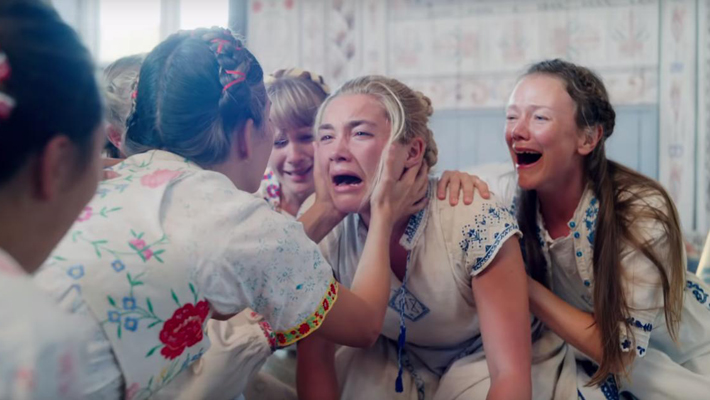Ok, then. I think I’m ready now.
And if I’m not, I think, realistically, I have passed the point where it matters. I want to talk about Midsommar. A lot. And delaying it, waiting for some divine spark to break free the mythological dam of the oft cited “right words”… well that’s just foolish. And we’re not fools, are we? So I’m going to pick my way through the bramble of too many ideas and a complicated through line, and hope that you bear with me here, as you so reliably have in the past. Because I want to talk about Midsommar, the essence of it, while giving away as little of the substance as possible.
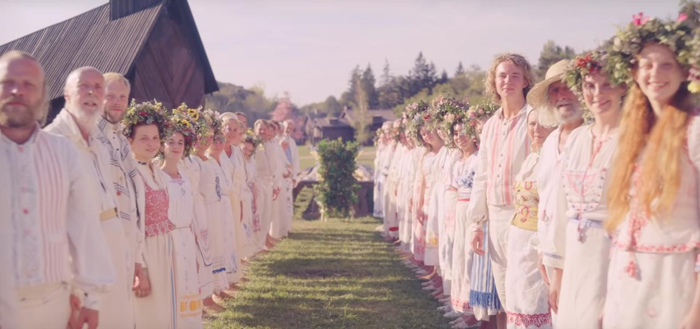
An Ari Aster movie is a gift. And like Hereditary before it, Midsommar is a kind of blueprint of a haunted house. You can see the rooms, as they stand, look at the cross cut, observe the plans, but it’s not until you are standing in the room that you understand that something is deeply, aggressively wrong. Sure, anyone can reasonably surmise that when Dani – unbalanced, traumatized by recent loss, and grasping desperately for human connection – agrees to go with her disinterested, “foot half out the door” boyfriend, Christian, to a once every 90 years festival in Sweden, that, uh-oh, it’s a very bad idea, and nothing good can possibly come of it. And you can leave the tarot cards in their deck, no extra senses are necessary to assume that the handful of Americans in the sunny, Swedish commune are going to suffer more than culture shock. Me telling you that shit gets crazy at the Midsommar festival… well, that, I would hope, goes without saying. If you have heard of Midsommar enough to have clicked on this article, I assume you have an at least functional understanding of what’s at play here. But much as Hereditary was a strained rumination on the possession story, filtering the abstract notion of grief into something very literal, Midsommar is the folk horror manifestation of a relationship that is forever dying, without every actually drawing its final breath. And this, dear friends, is part of the magic of Ari Aster.
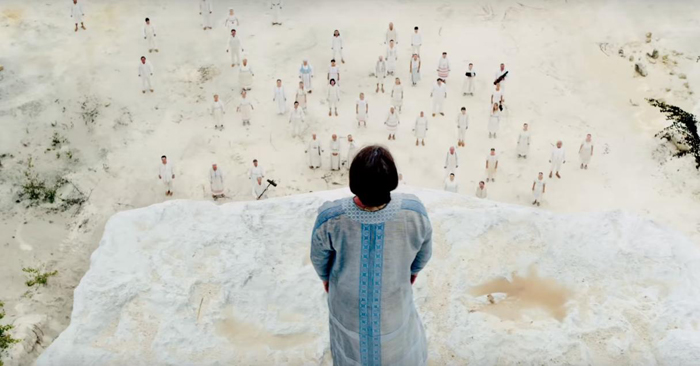
You will hear a lot of people in the coming days comparing Midsommar to The Wicker Man. And I get it. It’s an obvious reference point. But the two films function in a few fundamentally different ways, one so prevalent that it nullifies the validity of the comparison. The Wicker Man is a mystery. It begins as mystery; something you are trying to solve, and the narrative unravels to explain the actions and events of the plot. Midsommar is comprehensively not. There are, for certain, mysterious things, but no one arrives with thoughts of nefarious undertakings. And perhaps more importantly, no one in the Swedish commune is trying to hide anything. They are extremely open. The Wicker Man challenges the viewer to join the central detective in trying to follow clues and make connections. Midsommar asks you to let it all happen to you.
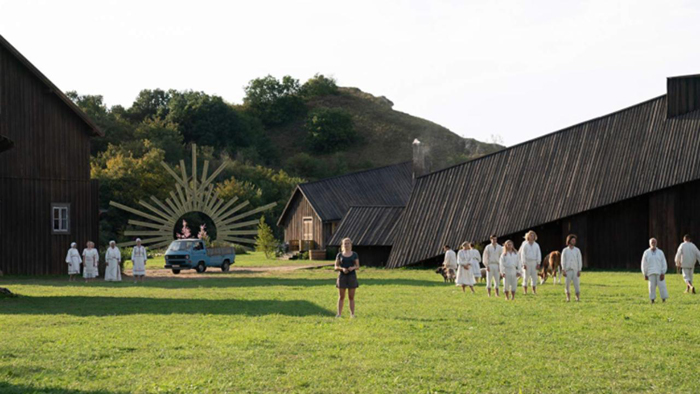
So I refuse the comparison to The Wicker Man. To anything, in many ways – Midsommar is fully its own, influences be damned. But after watching it, sleeping with it, chewing it up with my breakfast and breathing it out with my well-worn heat exhaustion, I have found that there is a movie I cannot stop comparing it to in my mind. And that is The Last Five Years – a musical based around the long, slow death throes of a relationship, where one partner is done, but too cowardly to leave, and the other partner is holding on desperately. It is, almost to the year (Dani mentions at one point that she and Christian have been together for four years) the same story. Kathy is a stalled actress, whose life is standing still and feels like an exercise in futility. Jaime is her successful novelist partner, for whom everything is moving forward for, so much so that he is perfectly content to leave her behind. He does lip service to the work, but provides none of the deeper understanding and empathy a partnership needs to thrive. And the more dismissive he becomes, the more Kathy needs him. Dani is a student – a little aimless after a tragedy I will not define here – who has nothing in the world but Christian. Christian is an anthropology student who finds her neediness tedious and is perfectly content to blow her off pretty abruptly to go to Sweden with his friends. Worse, when she confronts him – perfectly reasonably – about the fact that he neglected to mention any trip to Sweden to her, he gaslights her into feeling as if she owes him an apology. Christian is never overtly cruel to Dani – it might be more palatable if he were. His is the slow, bitter hurt of neglect and dismissiveness. He forgets her birthday. When he sees her upset, he “gives her some time”, when what she clearly wants is him. To circle it back to The Last Five Years, at one point, Kathy sings to Jaime: “I swear to god, I’ll never understand, how you can stand there, straight and tall, and see I’m crying, and not do anything at all”. The same passiveness possesses both Jaime and Christian – the “but I’m a good guy” instinct that says if you’re not overtly horrible to your partner, then surely, you’re still a good dude. Even if that indifference is slowly eating away at them, as it is Dani and Kathy.
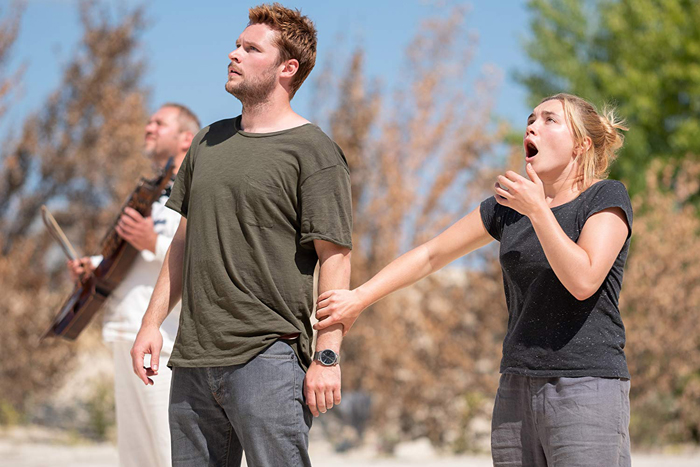
So why bring this up, other than to shamelessly cater to that huge cross section of the Venn diagram that loves both musicals and horror films? To return to the question of polarity, and its corresponding “is this for me?” follow-up, horror is a complicated, nuanced genre. Fear is a fundamentally subjective reaction. But to understand that the horror of Midsommar comes from the unique terror that can overtake us in heartbreak and to know that this is a movie with the same depth of emotion and empathetic pull of a two person musical may give you an indicator of what you’re dealing with. There aren’t jump scares in Midsommar. And if you have either never had your heartbroken in a slow, grinding way, or lack the empathy to invest in the idea of it, or, to be totally fair, if you would just prefer your demons to be spookums that bump in the night (which is legit! Why shouldn’t you?) it is quite possible you will feel dissatisfied with this film. I am mostly loathe to reveal much regarding my personal life and experiences, but I think it warrants a nod here; I’ve been Dani. I’ve been Kathy. I know that no horrors can ever match the stillness of seeing clearly that someone you love no longer loves you, that they see you as a burden, and obligation, and you are paralyzed to do anything about it. Everything that happens in the movie is anchored by that undercurrent. The isolation it feeds.
I’ve gotten both long winded and heavy, so I’ll end on a sort of light note, that also manages to encapsulate a lot of the essence of Midsommar. I read a tweet the other day where a woman described hearing a couple leaving Midsommar. The guy said, “I’m not sure he deserved that,” and his girlfriend said, “You WOULD think that.” How greatly you feel the ending is earned will hang a good deal on how much you see that the true horror isn’t the pagan cult at the core (though of course there is much to be said about that, but nothing I can proffer without wearing my spoilers cap) but the pain of remaining inside a dead thing.

